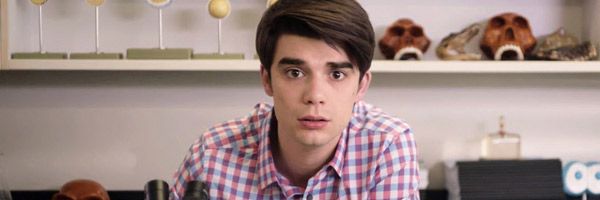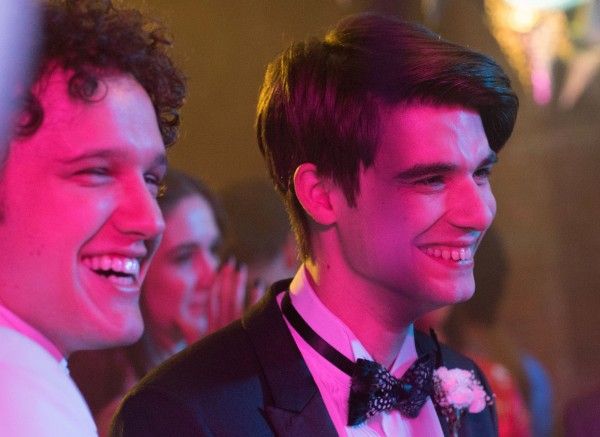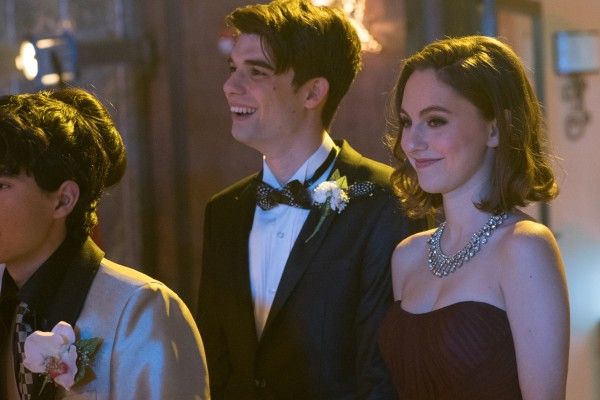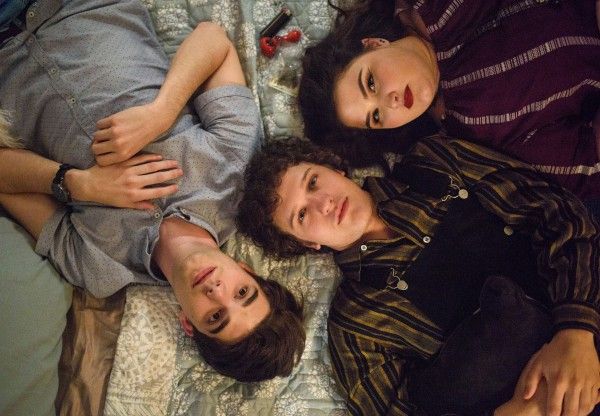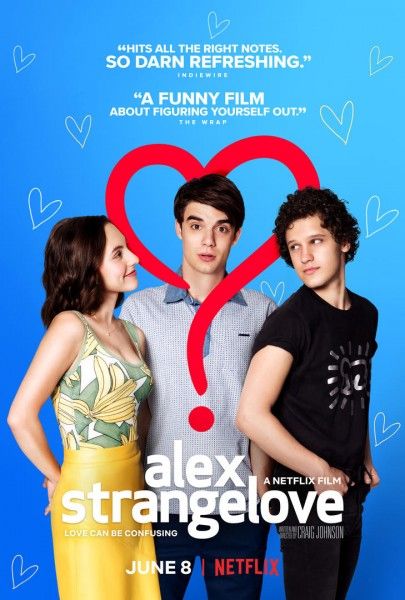From writer/director Craig Johnson, the Netflix original film Alex Strangelove tells the story of high school senior Alex Truelove (Daniel Doheny), a well-rounded teenager with a bright future ahead of him, who decides that he’s going to lose his virginity to his wonderfully sweet girlfriend Claire (Madeline Weinstein). But when Alex meets the charming and gay Elliot (Antonio Marziale), things get complicated, as he begins to wonder about and explore his own sexuality and what that could mean for his journey ahead.
During this 1-on-1 phone interview with Collider, filmmaker Craig Johnson (The Skeleton Twins) talked about why he wanted to tell this story, the film’s evolution over the years before it went into production, how the attitudes of teenagers has most changed, why casting was so crucial, and the most fun days on set. He also talked about his desire to adapt the college baseball novel The Art of Fielding and to make a documentary about The B-52's.
Collider: I thought this was a really sweet movie. What sparked the story that you wanted to tell with this film? Did it start with ideas that you wanted to explore, or did it start with the character?
CRAIG JOHNSON: I will not lie, it’s at least partially autobiographical. I didn’t go through exactly the same journey that Alex goes through, in high school, but I did have a circuitous and incremental coming out process that took me well into my 20s, before I figured it out. I had various stops along the road. Bisexual was a stop on the bus for me. It’s a perfectly legit identity, but for me, it was just bi now, gay later. Once I figured it out, I looked back, and I was just starting my career as a filmmaker then, and I was like, “Wow, if you took this rollercoaster of sexual confusion that I’ve been on, and if you condense it into one kid’s senior year of high school, it could make for a really fun, almost classic teen movie, or a high school sex comedy.” That’s where it started.
You first started working on this almost a decade before we’re actually getting to see it now. How long did the process of actually writing it take you, and how much did you go back to it and change things, over the years?
JOHNSON: The spark that I was talking about was actually lit in 2008, when I went to a concert for the British pop singer Mika. I was at his concert and I was blown away by the number of out-of-the-closet teenagers that I saw there, just living out loud, mingling in groups and holding hands, with no shame. I just thought, “Wow, high school is a different time!” That’s when I thought, “What if I took my coming out story and did it as a high school movie?” Then, I just saw the whole movie. I wrote the first draft, in 2008, in two months. That was 10 years ago, and I have been trying to get it made, ever since. It’s been my passion project for the last 10 years, and I would pretty consistently update it. The biggest rewrite happened in the last couple of years, just as high school life has gotten a little more progressive. Kids have gotten more open-minded. Coming out in high school is now not only an option, but there’s the option to come out as gender queer, or trans, or asexual, and everything in between. I thought that was a fascinating world to set a story of sexual confusion in because that makes everything more confusing. When you have all of the options available to you, you have to be really honest with yourself about what you want, which is Alex’s struggle.
How do you really feel that the attitudes of teenagers have most changed, since you first started thinking about who this character could be?
JOHNSON: Oh, gosh, I think there’s a public conversation now. It has so much to do with visible role models, in television, in movies and on social media. I was a teenager in the ‘90s, and I had none of that. I had to search far and wide for anybody. I remember the first couple of seasons of The Real World on MTV because it had gay young people on it. I would watch those [episodes] religiously, just for identification, or I’d rent gay French coming of age movies. I couldn’t even really find American ones, at that time, but I wanted to see someone my age who shared my feelings. I really look to the storytellers out there, and the filmmakers and television that’s out there, where you can see depictions of queer teenagers and queer people, as role models, has made kids today be able to say, “Hey, look, I’m not alone! I shouldn’t be ashamed, if I feel this way. I’m gonna come out.” I think social media and the internet have done so much to feel connected and give kids confidence.
How did you come to name the character Alex Truelove, and then decide to name the movie Alex Strangelove?
JOHNSON: I can’t remember which name I thought of first. I grew up with some family friends, whose last name was Truelove, and I’ve always thought that’s a great last name. There’s something metaphorical going on there. So, I think it might have just started with his last name, and then there was a little play on Dr. Strangelove as a title. It just made sense. That was the theme of the movie, so it all coalesced in my brain.
For a movie like this to work, the casting seem like it’s absolutely crucial because you want and need your audience to take this ride, on your character’s side. How did you find your lead actor, and what were the qualities that you were looking for?
JOHNSON: It was the most daunting and most exciting casting decision that I’ve ever had to make. We hired two casting directors, David Rubin in L.A. and Richard Hicks in New York, and I said, “Gentleman, show me everybody – every kid in America, every kid in Canada,” which they did. We saw hundreds and hundreds of kids, for all the roles. I didn’t want to cast anybody until we knew who our Alex was. It’s a tall order to ask an unknown actor to carry a whole movie, so I was looking for somebody with just the right amount of charisma and some comedic chops, but also a kid who really, plausibly hadn’t figured himself out yet, and who we could believe as a straight kid, a bi kid, and a gay kid. Daniel [Doheny] showed up from Vancouver, Canada, with an incredible self-tape. We were struck by him, and he beat everybody out.
It’s also a little bit tricky because you have this guy at the center of your story, who is technically leading on his girlfriend. He knows that relationship isn’t fully there, and he’s getting closer with this guy that he’s met. How challenging was it to ensure that audiences understood that struggle and didn’t turn on him? Was who you cast to play off of him also important?
JOHNSON: Oh, gosh, that’s the trickiest part of the whole movie, just because, in Alex’s struggle, he engages in a lot of shitty and selfish behavior. It maybe hard to forgive him, especially if you’re Claire. I just wanted to make sure that I was honest to his struggle. He really was confused because his love for Claire is very authentic and very real, but so is his attraction to Elliot. When we found Maddie Weinstein to play Claire, she was fierce and smart and cool. She reminded me of all the girls I had crushes on, when I was in high school. The biggest concern was bringing Elliot into the picture, I was so worried that he would feel like a home wrecker. So, when we were casting Elliot, I said, “We have to find someone who is boyfriend material, and who is sweet-natured and not pressuring Alex, but who is challenging him, to a certain degree, and who really does like him, but is also no there to just sleep with Alex and throw him away.” We didn’t want him to leave Alex as gay roadkill. So, Antonio Marziale, with his sweet, good nature and his true boyfriend material persona, I figured that was the final key to making that trio work out, and make it so that we understood why he was conflicted between Claire and Elliot.
You have some really small, intimate moments in this, but you also have quite a few big moments in the film, from a gummy vomit shower to a concert to a prom. Did you have a favorite or most fun day on set, during this production?
JOHNSON: You mentioned two of them. One of them was shooting that concert scene. That band is Muna, and they’re an incredible synth-pop band of largely queer women. Everyone should check them out. They’re amazing! We shot that scene on one of our last days. It might have been our last day of shooting, or the second-to-last day. There was a celebratory feeling. It felt like we had been making a good movie and everyone was friends. Actors who had already wrapped came to the concert and hung out with us. There was such a feeling of jubilation and celebration when we were shooting that, which meant it felt so good. And then, showering those two with gummy puke in the bathtub was a wicked joy for me. I think we did that seven times. I’m not sure the actors would agree with me, but I got a big kick out of doing that to them.
You’ve said that you’re also working on an adaptation of a college baseball novel and a documentary about the B-52's, which seem like they’re on opposite ends of the spectrum. What’s the appeal of each of those projects, for you?
JOHNSON: Well, the baseball novel is called The Art of Fielding, and even though it is about a college baseball team, it’s really about these five different characters, in this small Midwest college, all stumbling through their lives. It’s very bittersweet. There are queer aspects to the story, so it’s not too out of my wheelhouse. I don’t know if I even have a wheelhouse, but in terms of bittersweet comedy/dramas, it’s in the pocket. And then, with The B-52's, I come at them as an utter fan boy, but they also have an incredible story to tell, as a band, especially from their inception through the 1980's. Not a lot of people know the story and know how influential they were, and what some of their struggles were. So, I am just dying to get that one off the ground, as well.
I love the B-52's. They’re so colorful and amazing, and there’s never been anyone like them, before or since.
JOHNSON: I couldn’t agree more. If you’re under 30 and I mention The B-52's, people often say, “Oh, yeah, I know ‘Love Shack.’ I heard that at a bar mitzvah.” But that’s all they know, and there’s so much more to their story, which is why I want to do the doc.
I’m 41, and when I was exposed to the B-52's, I remember thinking that this group of musicians sounded like beautiful aliens, and I loved it.
JOHNSON: Yeah, totally! We’re exactly the same age. If you were from our era and felt, at all, like an offbeat or alternative kid, the B-52's were there for you, saying, “Come listen to me.” What you really hadn’t seen, at that time, was dueling male-female vocalists, in one band. That was one thing that was so unique about them.
Do you have any idea when you might get either or both of those projects going, or are you just in development stages on them, right now?
JOHNSON: Yeah, you never know. As a filmmaker, you’re always spinning five or six different plates and trying to push all of them forward, hoping that, if four out of the five will crash to the ground, maybe you’ll get one of them made. That’s the phase that I’m in right now. I’m pushing forward on different things, crossing my fingers that one of them happens soon.
Alex Strangelove is available to stream at Netflix.

